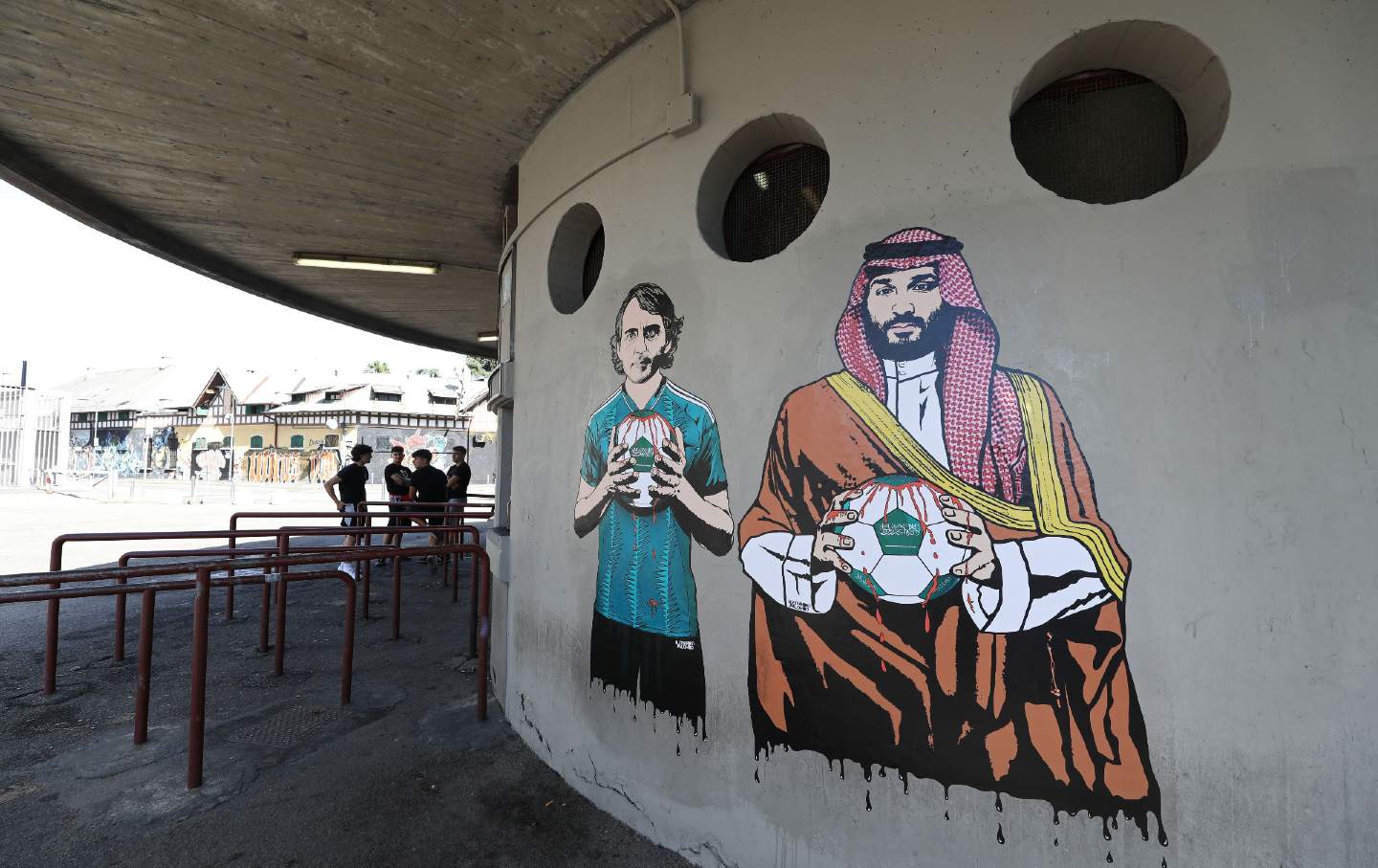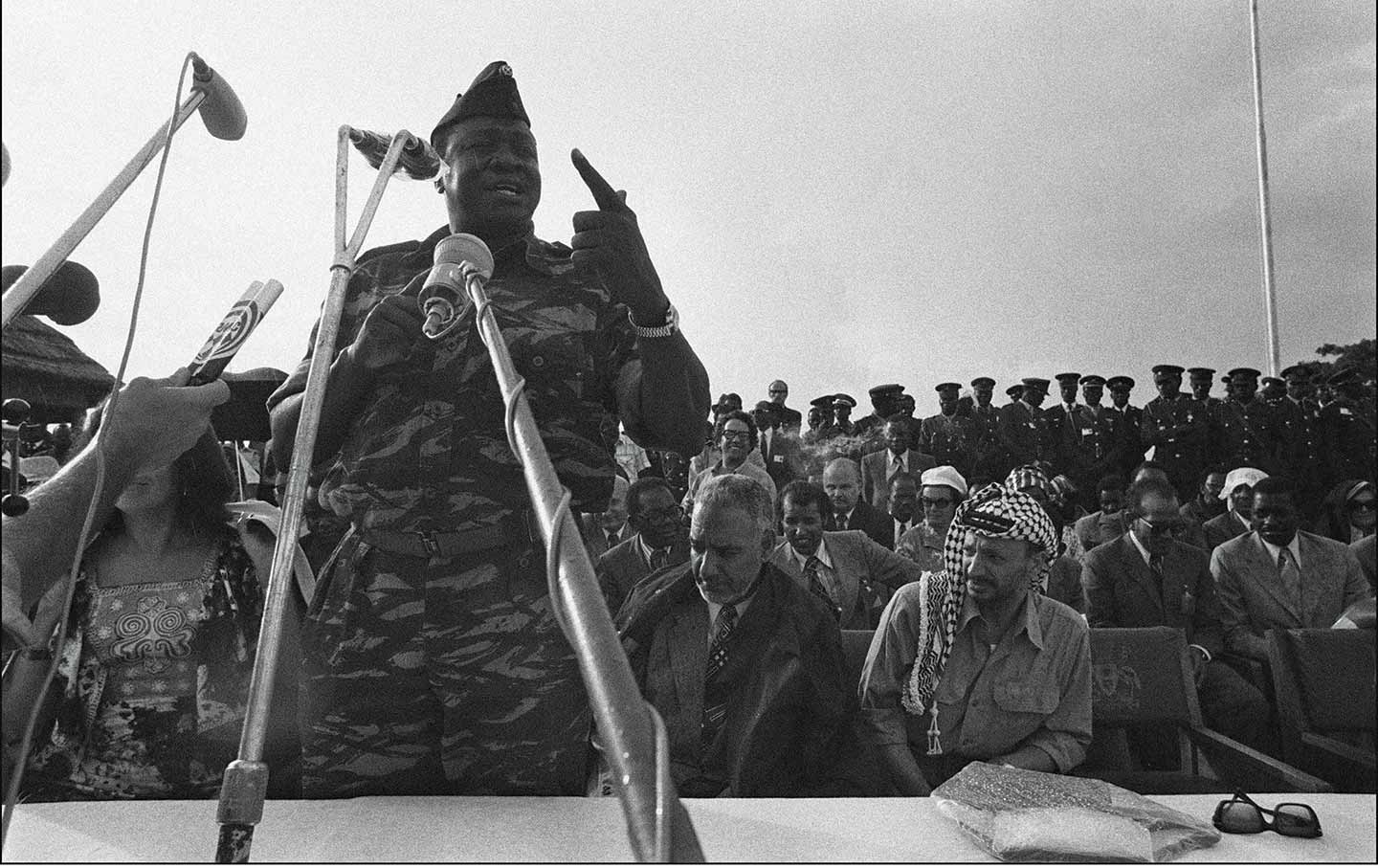Saudi Arabia Hosting the World Cup Is a Win for Sportswashing
Though not yet official, Saudi Arabia has all but muscled out the only other real contender.

A mural depicting Roberto Mancini and Mohammed bin Salman painted by aleXsandro Palombo outside the San Siro Stadium at Stadio Giuseppe Meazza, September 19, 2023, in Milan, Italy.
(Photo by Marco Luzzani / Getty Images)When FIFA President Gianni Infantino was caught on camera yukking it up with Saudi Prince Mohammed bin Salman at the opening match of the Qatar 2022 men’s World Cup, it captured the attention of politics and soccer mavens alike. Infantino and MBS were joined in the VIP section by members of Qatar’s royal family as well as Egypt’s President Abdel Fattah al-Sisi. Far beyond the world of soccer, people were wondering aloud whether MBS was positioning his country to host a future World Cup, perhaps alongside Egypt.
This week, the world got a definitive answer: Saudi Arabia is on an express path to hosting the 2034 men’s World Cup. Although FIFA will not announce its official decision until late 2024, this essentially became a foregone conclusion when Australia, the other country from the Asian and Oceania Football Confederations considering a run at hosting duties, chose to pass. Tariq Panja reported at The New York Times, “Australian officials concluded they would have been overmatched if they attempted to challenge Saudi Arabia to secure the votes of the majority of FIFA’s 211 federations. Saudi Arabia has signed agreements in the past year with scores of FIFA’s member nations, committing millions of dollars to projects across Asia and lavishing attention on Africa.” In other words, Saudi Arabia had essentially pre-bought the votes of countries throughout the world, and Australia did not see a point in going forward with a charade.
If sportswashing is when political leaders use sports to legitimize themselves on the global stage while stoking nationalism and diverting attention from human rights woes at home, then the almost-certain Saudi Arabia 2034 World Cup is sportswashing’s moment in the sun. MBS even recently said to his friends at Fox News that he will “continue doing sport washing” for Saudi Arabia. He also said that he “doesn’t care” about accusations of sportswashing people are making against his country. What other countries have denied, he has fully embraced—because he believes there is no one to stop him.
Saudi Arabia has taken the sporting world by storm, whether by hosting sports mini-mega events like the 2029 Asian Winter Games or by luring some of the world’s biggest names in soccer to play in its burgeoning domestic leagues: from Cristiano Ronaldo and Karim Benzima to N’Golo Kante and Neymar. This has been part of a long-term development plan, and it’s a key element of MBS’s “Vision 2030,” launched seven years ago.
As Danish researcher Stanis Elsborg notes in his just-published power map of Saudi sportswashing:The Kingdom’s plans involve nearly 300 sports sponsorships with tentacles that reach far and wide. While many know of Saudi Arabia’s de facto hostile takeover of the PGA through its LIV golf tour or the Saudi Arabian Public Investment Fund’s similar takeover of Newcastle United in the English Premier League, Elsborg’s report finds “significant conflicts of interest involving influential Saudi statesmen, and not least a troubling relationship between the sporting and political spheres in Saudi Arabia.”
Saudi Arabia’s entrance into the sports world also raises significant human rights concerns. Human Rights Watch issued a statement condemning FIFA’s telegraphed decision to hand the 2034 men’s World Cup to Saudi Arabia. The 2030 World Cup going to Morocco, Portugal, and Spain (with additional matches in Argentina, Paraguay, and Uruguay) is tantamount to breaking the group’s own human rights standards. Minky Worden, the director of global initiatives at Human Rights Watch, told The Nation, “FIFA’s human rights policy will be worth less than the paper it’s printed on if Saudi Arabia’s bid goes forward as planned.”
You don’t need a crack team of researchers to know that US President Joe Biden has been a bit player in MBS’s master plan. From his conspicuous fist bump to his relative quietude in the face of human rights atrocities, Biden has not deigned to make MBS “a pariah,” as he promised to do while on the campaign trail, after Washington Post journalist Jamal Khashoggi was killed in the Saudi consulate in Turkey in 2018. Instead, he has forged a relationship on the cold tundra of political amnesia.
Then there is Saudi Arabia and its newfound chummy relationship with Israel. Before the Hamas killings on October 7 and the subsequent total war on Gaza, Saudi Arabia and Israel looked to sign a set of accords to form a military and economic block against Iran. Given the extent of Israeli human rights violations in this war, do not think this is being done without Saudi input, or that anger at the new special relationship will make Saudi Arabia have to temporarily withdraw from their attempted pact. Either way, Palestinian blood is on MBS’s hands, too.
On the eve of the Qatar 2022 World Cup, Infantino, FIFA’s grifting prince, went on a zany bender of a speech, asserting, “Today I feel Qatari. Today I feel Arab. Today I feel African. Today I feel gay. Today I feel disabled. Today I feel a migrant worker.” He proceeded to state that actually “I’m not Qatari, African, gay, disabled and I’m not really a migrant worker” but that he understood firsthand discrimination because “I know what it feels like to be discriminated, to be bullied as a foreigner in a country. At school I was bullied because I had red hair and freckles.”
This sort of facile babble raised eyebrows at the time. But today it makes more sense. Infantino is willing to run interference for sportwashers, even if that makes him look buffoonish in the process, even if it means he must prostrate himself before the powerful, and even if it makes a mockery of the human rights principles that FIFA supposedly abides.
Disobey authoritarians, support The Nation
Over the past year you’ve read Nation writers like Elie Mystal, Kaveh Akbar, John Nichols, Joan Walsh, Bryce Covert, Dave Zirin, Jeet Heer, Michael T. Klare, Katha Pollitt, Amy Littlefield, Gregg Gonsalves, and Sasha Abramsky take on the Trump family’s corruption, set the record straight about Robert F. Kennedy Jr.’s catastrophic Make America Healthy Again movement, survey the fallout and human cost of the DOGE wrecking ball, anticipate the Supreme Court’s dangerous antidemocratic rulings, and amplify successful tactics of resistance on the streets and in Congress.
We publish these stories because when members of our communities are being abducted, household debt is climbing, and AI data centers are causing water and electricity shortages, we have a duty as journalists to do all we can to inform the public.
In 2026, our aim is to do more than ever before—but we need your support to make that happen.
Through December 31, a generous donor will match all donations up to $75,000. That means that your contribution will be doubled, dollar for dollar. If we hit the full match, we’ll be starting 2026 with $150,000 to invest in the stories that impact real people’s lives—the kinds of stories that billionaire-owned, corporate-backed outlets aren’t covering.
With your support, our team will publish major stories that the president and his allies won’t want you to read. We’ll cover the emerging military-tech industrial complex and matters of war, peace, and surveillance, as well as the affordability crisis, hunger, housing, healthcare, the environment, attacks on reproductive rights, and much more. At the same time, we’ll imagine alternatives to Trumpian rule and uplift efforts to create a better world, here and now.
While your gift has twice the impact, I’m asking you to support The Nation with a donation today. You’ll empower the journalists, editors, and fact-checkers best equipped to hold this authoritarian administration to account.
I hope you won’t miss this moment—donate to The Nation today.
Onward,
Katrina vanden Heuvel
Editor and publisher, The Nation








